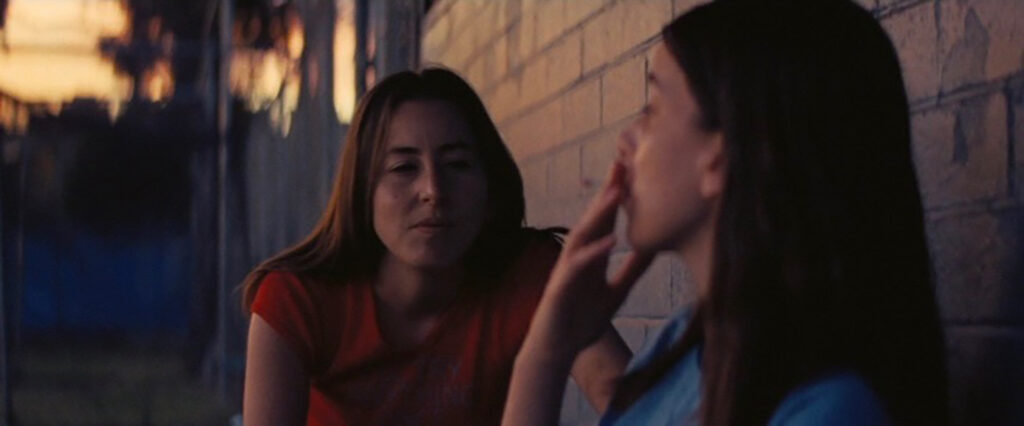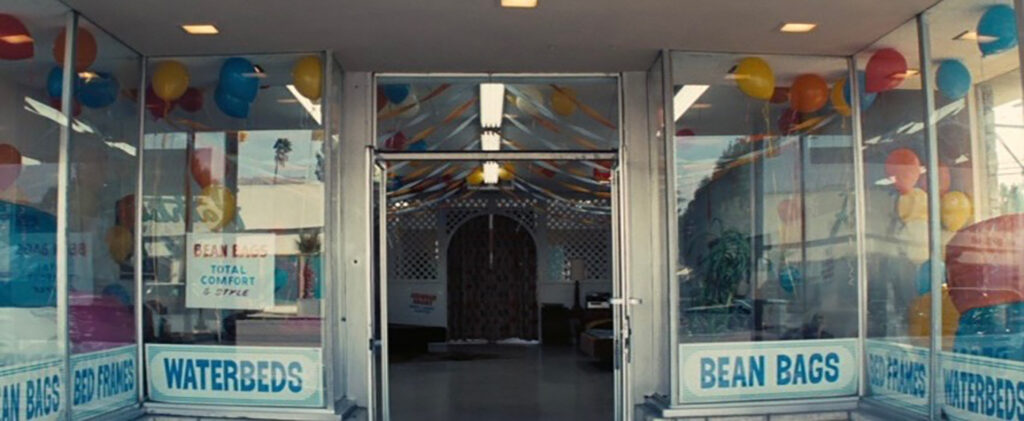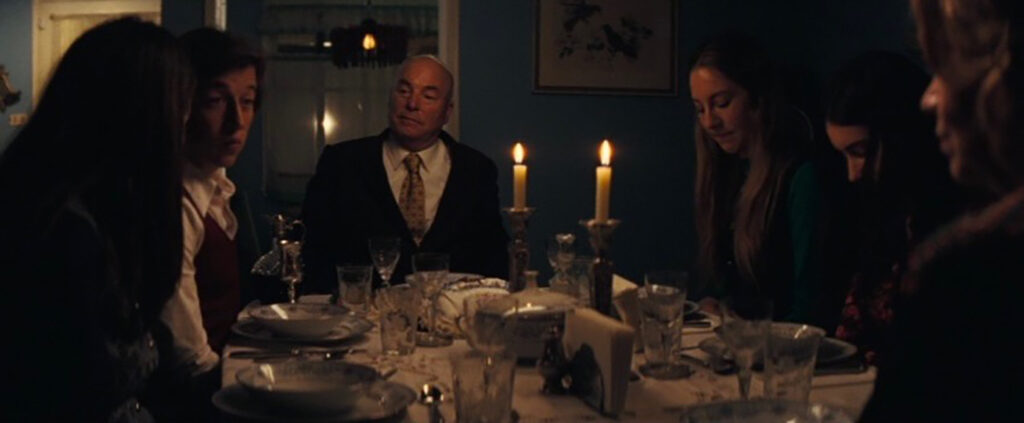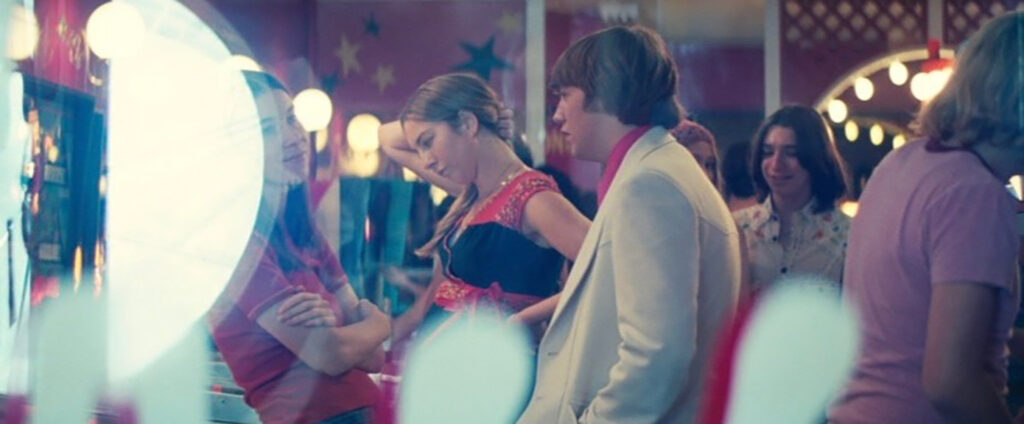| Steven Rybin |

Licorice Pizza plays on phenomenal 70mm at the Heights Theater on Monday, March 31st. For tickets, showtimes, and other series information, visit trylon.org.
15-year-old Gary Valentine (Cooper Hoffman), a teenage actor and budding entrepreneur, lives with his mom Anita (Mary Elizabeth Ellis) and younger brother Greg (Milo Herschlag) in the San Fernando Valley during the long summer of 1973. Whether it’s waterbeds or pinball machines, Gary always seems to find opportunities to show off his marketing skills. And so when he first sees Alana Kane (Alana Haim) walk by as he waits to take his high school yearbook photo in Paul Thomas Anderson’s Licorice Pizza (2021), Gary also sees a chance for a sales pitch. Asking Alana if she’s seen any of his bit parts in movies, it becomes clear he’s selling himself.
Anderson’s films are replete with hucksters hawking questionable goods: Tom Cruise’s misogynistic guru in Magnolia (1998); Cooper Hoffman’s dad, Philip Seymour Hoffman, as Dean Trumbell, whose mattress store fronts his phone-sex operation in Punch-Drunk Love (2003); Daniel Day-Lewis’s Daniel Plainview, drilling land for profitable oil in There Will Be Blood (2007); and Lancaster Dodd (Hoffman’s dad again), who sells a personality cult in The Master (2012). Sometimes these peddlers can be endearing; Don Cheadle’s stereo salesman Buck Swope in Boogie Nights (1997) earnestly endorses rocking sound systems, and Daniel Day-Lewis’s fashion designer Reynolds Woodcock in Phantom Thread (2017), despite his prickly, fussy demeanor, possesses admirable sartorial talents.
Teenaged Gary in Licorice Pizza isn’t interested in cults or good clothes, though. And unlike Daniel Plainview, whose veins seem to flow with oil rather than blood, Gary is utterly oblivious to the natural resources required to make his products (as becomes clear when Alana, after becoming his business partner in selling waterbeds, asks him if he’s heard about the nation’s fuel shortage). But there’s an emerging belligerence and hard ambition in Gary’s salesmanship that nevertheless likens him to those earlier Anderson pitchmen. If he isn’t careful, he could even end up like skeezy Dean in Punch-Drunk Love. As with Philip Seymour Hoffman’s character in the earlier film, Cooper Hoffman’s Gary sells mattresses, and reminiscent of Dean’s phone-sex side-hustle, Gary encourages Alana to “make it sexier” in her telephone sales pitches for their “Fat Bernie’s” waterbeds.

It’s Alana, though, who opens up another path. Although Licorice Pizza isn’t exactly a romantic comedy—25-year-old Alana repeatedly reminds her lovelorn teenaged friend they aren’t boyfriend and girlfriend—the movie to some extent works with the kind of dual-focus plot structure familiar from that genre. Dual-focus narratives place the potential romantic couple on parallel plot tracks that intermittently intersect, before the couple is finally formed at the end of the movie. The first act of Licorice Pizza mainly focuses on Gary as he draws Alana into his entrepreneurial orbit, but Licorice Pizza eventually balances its presentation of Gary’s self-centeredness with its portrayal of Alana Kane’s world. She is played by Alana Haim, backup vocalist and multi-instrumentalist in the band HAIM, which formed in Los Angeles in 2007 and released the first of their (to date) three albums in 2012. Alana’s bandmates are her two older sisters, Danielle and Este, who also appear in the movie as the two other Kane sisters, also named Danielle and Este. The three sisters are veterans of Anderson’s work; since 2017, the director has filmed many of their music videos, including, most recently, the energetic “The Steps” (2021), codirected by Anderson with Danielle, and “Lost Track” (2022), an elegant B-side.
The Kane sisters in Licorice Pizza aren’t in a rock group, although middle sister Danielle is apparently a musician. At Gary’s encouragement, Alana tries out for an acting role (a riff on Kay Lenz’s performance in Clint Eastwood’s 1973 film Breezy), and she brings along Danielle’s guitar as a prop. After the audition, Alana joins the film’s William Holden equivalent, Jack Holden (Sean Penn), for a bizarre round of drinks that ends with Alana being knocked off a motorcycle during a fiery obstacle course stunt orchestrated by raconteur Rex Blau (Tom Waits). In that accident, Alana crushes Danielle’s guitar. Music sometimes guides characters to where they need to go in Paul Thomas Anderson films—think of Adam Sandler’s discovery of the right, loving notes to play on a busted harmonium in Punch-Drunk Love. The fact that we never hear Danielle play any music on her guitar that Alana has borrowed (and that she has broken—shades of that out-of-tune, damaged harmonium in Punch-Drunk again) doesn’t mean that Alana doesn’t listen to her sister.
In the film, the relationship between Alana and oldest sister Este, who teases Alana about the “stupid boyfriends” she brings home, is a little contentious. Danielle, by contrast, as her lending of the guitar suggests, is a quietly reliable pal. These sister dynamics will be familiar to fans of the band (and it’s clear Anderson, also a fan, wrote their parts with their personalities in mind). Danielle, despite her status as the band’s lead singer, is known as the one who doesn’t get to talk much (see this fan cut You Tube video of Danielle trying to speak up in interviews as Alana and Este dominate the conversation, as well as the ending of Anderson’s “Lost Track” video, which underscores the middle sister’s frustration at her siblings’ loquaciousness). Danielle doesn’t say much in Licorice Pizza, either, but she doesn’t have to. Her brief scenes quietly guide Alana along her emotional trajectory, much as the “Wise Up” musical sequence in Magnolia moved characters toward epiphanies via Aimee Mann’s song.
Early in the film, Alana brings home a potential boyfriend for Shabbat family dinner, handsome Lance (Skyler Gisondo), whom she meets while traveling as Gary’s chaperone to his New York variety show appearance early in the film. Like Alana and her family, Lance is Jewish, and so Alana’s dad invites him to say a blessing before the meal. (The Haim parents, Mordechai and Donna, play versions of themselves in the film; Donna was Paul Thomas Anderson’s grade-school art teacher.) Lance respectfully refuses to bless the meal, informing Alana’s dad that he’s an atheist. This revelation brings the dinner to an uncomfortable, crashing halt. This scene is based on an anecdote the sisters told Anderson about a Shabbat dinner that did actually happen, although in reality it was Danielle who brought home the atheist beau; when Lance reveals his theological skepticism to the Haim patriarch, a humorous moment which Anderson films in one long take, Danielle slinks down in her chair, hiding her face behind her hair during the ensuing familial awkwardness. This moment connects Danielle’s memory of actual embarrassment with the one experienced in the scene by her younger sister’s character.

The fact that some of Danielle’s real experience is woven into Alana’s screen character strengthens the film’s depiction of the special camaraderie between these two sisters. “I think it’s weird that I hang out with Gary and his 15-year-old friends all the time” is the conclusion Alana draws while smoking a joint with Danielle in a dugout a little later in the movie. And while there are some Gary and Alana hijinks still to come (the opening of the waterbed storefront, and Alana’s daring navigation of a backwards-hurtling, out-of-gasoline delivery truck), it’s that dugout scene with Danielle that plants the seed for Alana to find a focus outside of Gary. Eventually wearying of her adolescent friend’s immaturity, Alana volunteers for the Los Angeles City Council campaign of Joel Wachs (Benny Safdie, playing a character based on the California politician of the same name). Alana soon becomes involved in making campaign films for Wachs, in which she enlists Gary as cameraman, now less her business partner and more her employee.
But maturity doesn’t have to exclude having a good time. And Alana, despite Gary’s occasional obnoxiousness, has had fun with him. It’s once more rocksteady Danielle who, reminding her sister of those good times, guides Alana toward harmony. When Alana takes a phone call from Danielle while working at campaign headquarters, her sister tells her that Gary stopped by the house to see her, hoping she and her sisters would join him for the grand opening of his Pinball Palace. “But they have free Pepsi,” Danielle wisely advises when Alana says she’s too busy with serious political matters for pinball. It’s also Danielle who, seeing Gary looking forlorn later that night at the pinball arcade, advises him to go look for Alana at the Wachs offices.

Sometimes you should listen to your sister (or, in Gary’s case, to the older sister of the girl you like). Licorice Pizza ends with Gary and Alana, having traveled their somewhat separate narrative paths, reuniting in front of a movie marquee. Alana’s sister’s guidance has helped bring Alana and Gary back together, harmonizing the dual-plot structure of the film like only a true musician could. As the film ends on a summer night in 1973, we don’t know what will happen to Gary and Alana come autumn. But just as Adam Sandler fixes that harmonium at the end of Punch-Drunk Love, I’d like to imagine that Alana eventually gets around to patching up her sister’s broken guitar.
Edited by Matthew Tchepikova-Treon
